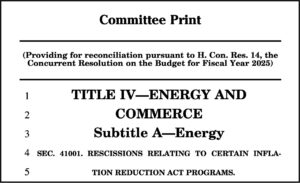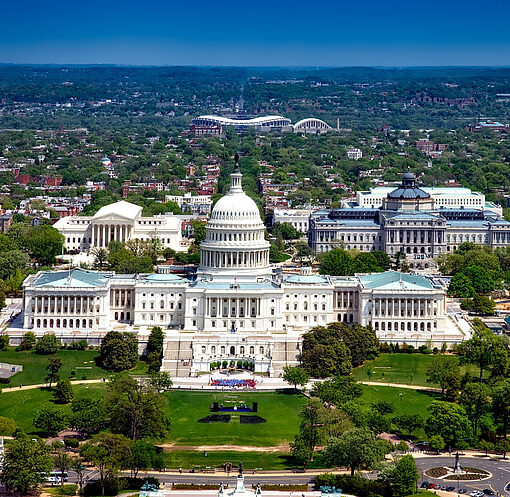 The reconciliation process for the fiscal year 2025 federal budget is underway and, unsurprisingly, various provisions of the Inflation Reduction Act of 2022 (IRA) are at risk. On May 11, 2025, the House Committee on Energy & Commerce introduced proposed text for the reconciliation bill, which will be considered at the budget reconciliation markup on May 13, 2025. The draft Energy Subtitle and the Environment Subtitle target several sections of the IRA for repeal, amendment, and/or rescission of appropriated funds.
The reconciliation process for the fiscal year 2025 federal budget is underway and, unsurprisingly, various provisions of the Inflation Reduction Act of 2022 (IRA) are at risk. On May 11, 2025, the House Committee on Energy & Commerce introduced proposed text for the reconciliation bill, which will be considered at the budget reconciliation markup on May 13, 2025. The draft Energy Subtitle and the Environment Subtitle target several sections of the IRA for repeal, amendment, and/or rescission of appropriated funds.
If the Energy Subtitle and the Environment Subtitle are adopted as proposed, all unobligated funds from twenty-six sections of the IRA would be rescinded. The twenty-six sections, which are implemented by the Department of Energy (DOE), Environmental Protection Agency (EPA), and Federal Energy Regulatory Commission (FERC), appropriated a total of $62 billion for climate-related funding programs. We estimate that up to $9.65 billion of that may not have been obligated by federal agencies and thus could be at risk of rescission if the reconciliation bill is enacted in its current form. Even more could be at risk if federal agencies move ahead with terminating award agreements and those terminations are upheld by the courts—the money that would have otherwise been required to be paid under those agreements could then be considered “unobligated.”
A full list of IRA sections included in the reconciliation bill can be found at the end of this blog post. One interesting provision of the reconciliation bill to note is section 42113(a), which would repeal part (but notably not all) of the IRA’s methane emissions reduction program (IRA section 60113). The reconciliation bill only proposes to repeal subsections 60113(a) and (b), which are the financial assistance provisions of the program. The bill would not repeal the remaining provisions, which require the assessment of a methane waste emissions charge on certain oil and gas producers. This is a somewhat surprising choice, particularly because Congress has already demonstrated its hostility towards the waste emissions charge by exercising its authority under the Congressional Review Act to disapprove EPA’s final rule to implement that charge.
Evaluating the potential impact of the reconciliation bill is difficult, in part, because information regarding the amount of IRA funds that have been obligated by federal agencies can be hard to come by. Federal agencies often make announcements when they’ve selected entities to fund but the award process—i.e., the process of negotiating and executing an award agreement, complying with legal requirements, and transferring funds—can take significant time after that. Funds don’t become “obligated” until that process is complete.
For example, back in December, EPA announced that it “tentatively selected” applicants to receive $735 million in awards under the Clean Heavy Duty Vehicles program (IRA section 60101) and expected to finalize award agreements in January 2025. However, the agency has not confirmed whether it finalized those agreement, so it is possible the $735 million has not technically been obligated.
Additionally, IRA funding has, in many cases, been comingled with other funding sources—especially the Infrastructure Investment and Jobs Act of 2021—so when an agency announces awards with multiple funding sources, it is hard to attribute a specific amount to the IRA. This is particularly true with the DOE loan programs, where money appropriated for loans and loan guarantees may be leveraged, recycled, or intermingled with private funds.
Despite the relative uncertainty, the Sabin Center estimates that $9.65 billion of the appropriated $62 billion is still left unobligated and could be rescinded if the reconciliation bill were enacted in its current form. In many cases, DOE, EPA, and FERC have awarded at least some, if not most or all, IRA funds under each program targeted in the reconciliation bill. However, there are a handful of sections for which there is no public indication that any funding has been obligated. These sections include: EPA’s Diesel Emissions Reductions Grants (IRA section 60104); EPA’s Low Emissions Electricity Program (IRA section 60107); and EPA’s funding for enforcement technology and public information (IRA section 60110).
Although federal agencies made significant strides in implementing the IRA under President Biden, the rescission of unobligated funds would still have very damaging effects, preventing critical investments aimed at addressing climate pollution and protecting communities across the country. For example, the reconciliation bill would rescind unobligated funds under IRA section 60106, which appropriated $50 million to EPA to provide federal assistance for monitoring and reducing air pollution at schools in low-income and disadvantaged communities. The program has been lauded by school administrators for its investment in improving air quality for children across the country. Rescinding the remaining funds under this program would deprive potential awardees of approximately $16 million to create a healthier and safer school environment for students.
It is also worth noting that, although the reconciliation bill targets only unobligated funds, it also creates an indirect risk to some already-obligated IRA funds. The Trump administration has been aggressive in attempting to terminate IRA award agreements and claw back committed funds. Most significantly, EPA has purported to terminate eight award agreements under the Greenhouse Gas Reduction Fund (IRA section 60103), which are collectively worth $20 billion. EPA has also attempted to terminate fourteen award agreements under the Environmental and Climate Justice Block Grants program (IRA section 60201). Terminations under both IRA programs have been challenged in court (see here and here for more information on the litigation). However, if EPA were to prevail in the lawsuits and succeed in terminating those award agreements, it would claw back the previously awarded funds. In theory, those funds could once again be considered unobligated and would be subject to the rescissions required by the reconciliation bill. (In the context of the Greenhouse Gas Reduction Fund terminations, there is an added complication where clawed back funds may be considered “lapsed” appropriations; see here for more detail.) Although awardees have strong arguments in court that the terminations are illegal, if agencies continue down the path of terminating award agreements, it could mean that a much greater portion of IRA funds are possibly at risk through reconciliation.
For additional details on the IRA sections included in the reconciliation bill, see the table below.
IRA Section |
Program |
Agency |
Reconciliation Proposal |
| 50123 | State-Based Home Energy Efficiency Contractor Training Grants | DOE | Sec. 41001(a) of the reconciliation bill would rescind unobligated funds. |
| 50141 | Funding for DOE Loans Programs Office for Energy Efficient Projects | DOE | Sec. 41001(b) of the reconciliation bill would rescind unobligated funds. |
| 50142 | Low or Zero GHG Vehicle Manufacturing Grants | DOE | Sec. 41001(c) of the reconciliation bill would rescind unobligated funds. |
| 50144 | Energy Infrastructure Repurposing and Remediation Financing | DOE | Sec. 41001(d) of the reconciliation bill would rescind unobligated funds. |
| 50145 | Tribal Energy Loan Guarantee Program | DOE | Sec. 41001(e) of the reconciliation bill would rescind unobligated funds. |
| 50151 | Transmission Facility Financing | FERC | Sec. 41001(f) of the reconciliation bill would rescind unobligated funds. |
| 50152 | Grants to Facilitate the Siting of Interstate Electricity Transmission Lines | DOE | Sec. 41001(g) of the reconciliation bill would rescind unobligated funds. |
| 50153 | Interregional and Offshore Wind Electricity Transmission Planning and Development | DOE | Sec. 41001(h) of the reconciliation bill would rescind unobligated funds. |
| 50161 | Clean Industrial Facilities | DOE | Sec. 41001(i) of the reconciliation bill would rescind unobligated funds. |
| 60101 | Clean Heavy Duty Vehicles | EPA | Sec. 42101(a) of the reconciliation bill would repeal this IRA section. Sec. 42101(b) would rescind unobligated funds. |
| 60102 | Grants to Reduce Air Pollution at Ports | EPA | Sec. 42102(a) of the reconciliation bill would repeal this IRA section. Sec. 42102(b) would rescind unobligated funds. |
| 60103 | Greenhouse Gas Reduction Fund | EPA | Sec. 42103(a) of the reconciliation bill would repeal this IRA section. Sec. 42103(b) would rescind unobligated funds. |
| 60104 | Diesel Emissions Reductions Grants | EPA | Sec. 42104(a) of the reconciliation bill would repeal this IRA section. Sec. 42104(b) would rescind unobligated funds. |
| 60105 | Air Pollution Monitoring Grants | EPA | Sec. 42105(a) of the reconciliation bill would repeal this IRA section. Sec. 42105(b) would rescind unobligated funds. |
| 60106 | Reducing Air Pollution at Schools | EPA | Sec. 42106(a) of the reconciliation bill would repeal this IRA section. Sec. 42106(b) would rescind unobligated funds. |
| 60107 | Low Emissions Electricity Program | EPA | Sec. 42107(a) of the reconciliation bill would repeal this IRA section. Sec. 42107(b) would rescind unobligated funds. |
| 60108 | Advanced Biofuel Research and Development | EPA | Sec. 42108(a) of the reconciliation bill would repeal this IRA section. Sec. 42108(b) would rescind unobligated funds. |
| 60109 | Funding for HFCs phase-out | EPA | Sec. 42109(a) of the reconciliation bill would repeal this IRA section. Sec. 42109(b) would rescind unobligated funds. |
| 60110 | Funding for Enforcement Technology & Public Information | EPA | Sec. 42110(a) of the reconciliation bill would repeal this IRA section. Sec. 42110(b) would rescind unobligated funds. |
| 60111 | Greenhouse Gas Corporate Reporting | EPA | Sec. 42111(a) of the reconciliation bill would repeal this IRA section. Sec. 42111(b) would rescind unobligated funds. |
| 60112 | Environmental Product Declaration Program | EPA | Sec. 42112(a) of the reconciliation bill would repeal this IRA section. Sec. 42112(b) would rescind unobligated funds. |
| 60113 | Methane Emissions Reduction Program | EPA | Sec. 42113(a) of the reconciliation bill would repeal two subsections of this IRA section that relate to federal funding but not the subsections requiring assessment of a methane waste emissions charge. For the repealed subsections, Sec. 42133(a) would also rescind unobligated funds. |
| 60114 | Greenhouse Gas Pollution Grant Program | EPA | Sec. 42114(a) of the reconciliation bill would repeal this IRA section. Sec. 42114(b) would rescind unobligated funds. |
| 60115 | Funding for Environmental Reviews | EPA | Sec. 42115(a) of the reconciliation bill would repeal this IRA section. Sec. 42115(b) would rescind unobligated funds. |
| 60116 | Labelling of Low-Embodied Carbon Materials | EPA | Sec. 42116(a) of the reconciliation bill would repeal this IRA section. Sec. 42116(b) would rescind unobligated funds. |
| 60201 | Environmental and Climate Justice Block Grants | EPA | Sec. 42117(a) of the reconciliation bill would repeal this IRA section. Sec. 42117(b) would rescind unobligated funds. |





